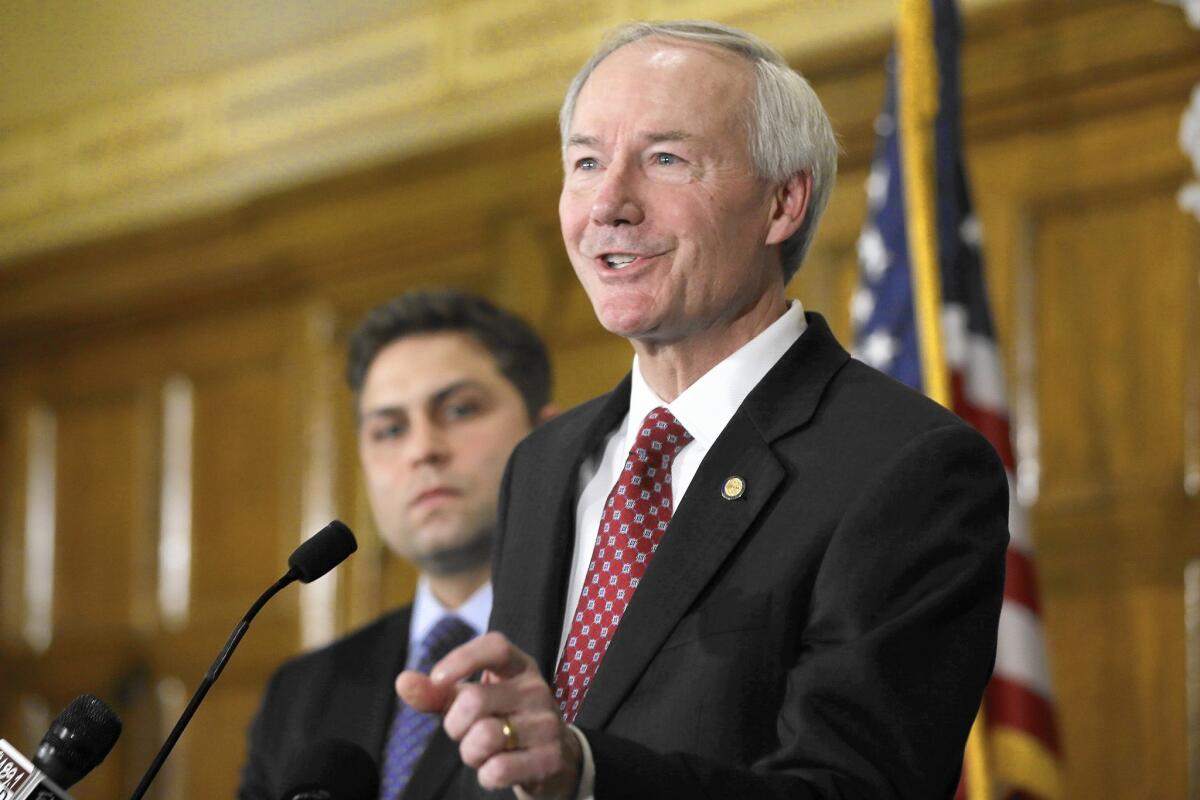As in Indiana and Arkansas, corporate America now wields clout on social issues

- Share via
Corporate America usually hasn’t viewed hot-button social issues as any of its business.
Then came Indiana.
The controversy over the state’s religious rights measure signed into law last week has been striking for the parade of well-known businesses that not only joined in the opposition to the law but took the lead in voicing their disapproval.
From Apple Inc. in Silicon Valley to Eli Lilly & Co. in Indianapolis, the corporate revolt crossed sectors and regions and is widely seen as crucial in forcing the hasty retreat of many conservative lawmakers both in Indiana and in Arkansas, where a similar bill passed this week now is in limbo.
Arkansas Gov. Asa Hutchinson, a Republican, and allied state lawmakers found themselves in the crosshairs of the state’s largest employer, Wal-Mart Stores Inc., even before the legislation passed.
The law “threatens to undermine the spirit of inclusion present throughout the state of Arkansas and does not reflect the values we proudly uphold,” Doug McMillon, Wal-Mart’s chief executive, said on the company’s Twitter account in asking Hutchinson to veto it.
The governor decided Wednesday that the measure needed to be fixed and sent it back to the Legislature. Meantime, in Indiana, lawmakers are expected to revise their law as soon as Thursday.
The surprising assertiveness from the corporate leaders reflects shifting public attitudes in general and among younger adults in particular on lesbian, gay, bisexual and transgender rights.
“There’s now an expectation from consumers that companies are going to act as citizens of the world in a different way, that they’re going to take responsibility for things that are outside the direct customer-investor model,” said Adlai Wertman, professor at USC’s Marshall School of Business.
“The risk-reward profile has changed,” he said. “It’s gone from ‘I’m afraid I might offend somebody’ to ‘If I don’t do these things, I’m letting down my customers.’”
Apple Chief Executive Tim Cook wrote an opinion column in the Washington Post on Sunday opposing such legislation and specifically made a point to say he was sharing not just his personal views but speaking “on behalf of Apple.”
“Apple is open. Open to everyone, regardless of where they come from, what they look like, how they worship or who they love,” Cook said.
A more progressive social agenda among businesses comes at a time when same-sex marriage is legal in about three dozen states and the District of Columbia.
In addition, a recent survey by the nonprofit, nonpartisan Public Religion Research Institute found that 80% of respondents opposed the concept of allowing small-business owners to refuse services on religious grounds to those who are gay, lesbian, bisexual or transgender.
Observers said the Indiana and Arkansas laws were seen as not-so-subtle invitations to overt discrimination, making public opposition not only less of a risk but almost an imperative.
Public companies, they said, go to great lengths to project an enlightened image in order to reflect their own increasingly diverse workforce and to appeal to a public, particularly younger customers, that places a premium on tolerance and diversity.
“I don’t think this is entirely out of the goodness of their hearts,” said Rick McGahey, a former assistant secretary for policy at the Department of Labor.
He said companies such as Wal-Mart and Eli Lilly already have difficulty recruiting top-level talent to small Midwestern cities and would have an even harder time if the states were perceived to tolerate discrimination.
“It hurts them in the global talent competition,” said McGahey, now a professor of public policy and economics at New York’s New School.
In the case of the Indiana and the Arkansas laws, McGahey said, businesses were able to argue that they weren’t taking sides between religious or civil rights, only opposing what everyone is against: discrimination.
“They’re not asking for aggressive new protections,” he said. “They just want a level playing field.”
Laura E. Durso, director of LGBT Research and Communications Project at the Center for American Progress, a research and advocacy group in Washington, said corporations have been moving toward more gay-friendly policies for some time.
Today, 89% of Fortune 500 companies have policies in place prohibiting discrimination on the basis of sexual orientation, and two-thirds provide domestic-partner heath insurance benefits to their employees, according to the Human Rights Campaign.
“This is something the business community has really led on,” Durso said.
Then there are dollars-and-cents issues. A review of scholarly literature last year by the Williams Institute, a think tank at UCLA School of Law, found that LGBT workers at companies that adopted policies of nondiscrimination and domestic-partner benefits were more productive and more committed to their jobs.
Perhaps more immediately, the backlash that followed adoption of Indiana’s controversial Religious Freedom Restoration Act has put at risk as much as $250 million in economic activity, according to the Center for American Progress.
Though companies historically have shied away from such public debates, opting to focus primarily on running their businesses, many now are realizing that they can use their clout to wield considerable influence in the public discourse and force the hands of governors and congressmen.
“That’s part of the dynamic: It’s both the right thing to do, but it’s also an opportunity to have an impact here,” said Luther Lowe, vice president of public policy at the customer review site Yelp in San Francisco.
“The heart of speaking up is about putting a stake in the ground both for Yelp’s employees, its community and for what’s right,” Lowe said.
Starkman reported from New York, Chang from Los Angeles.
More to Read
Inside the business of entertainment
The Wide Shot brings you news, analysis and insights on everything from streaming wars to production — and what it all means for the future.
You may occasionally receive promotional content from the Los Angeles Times.












